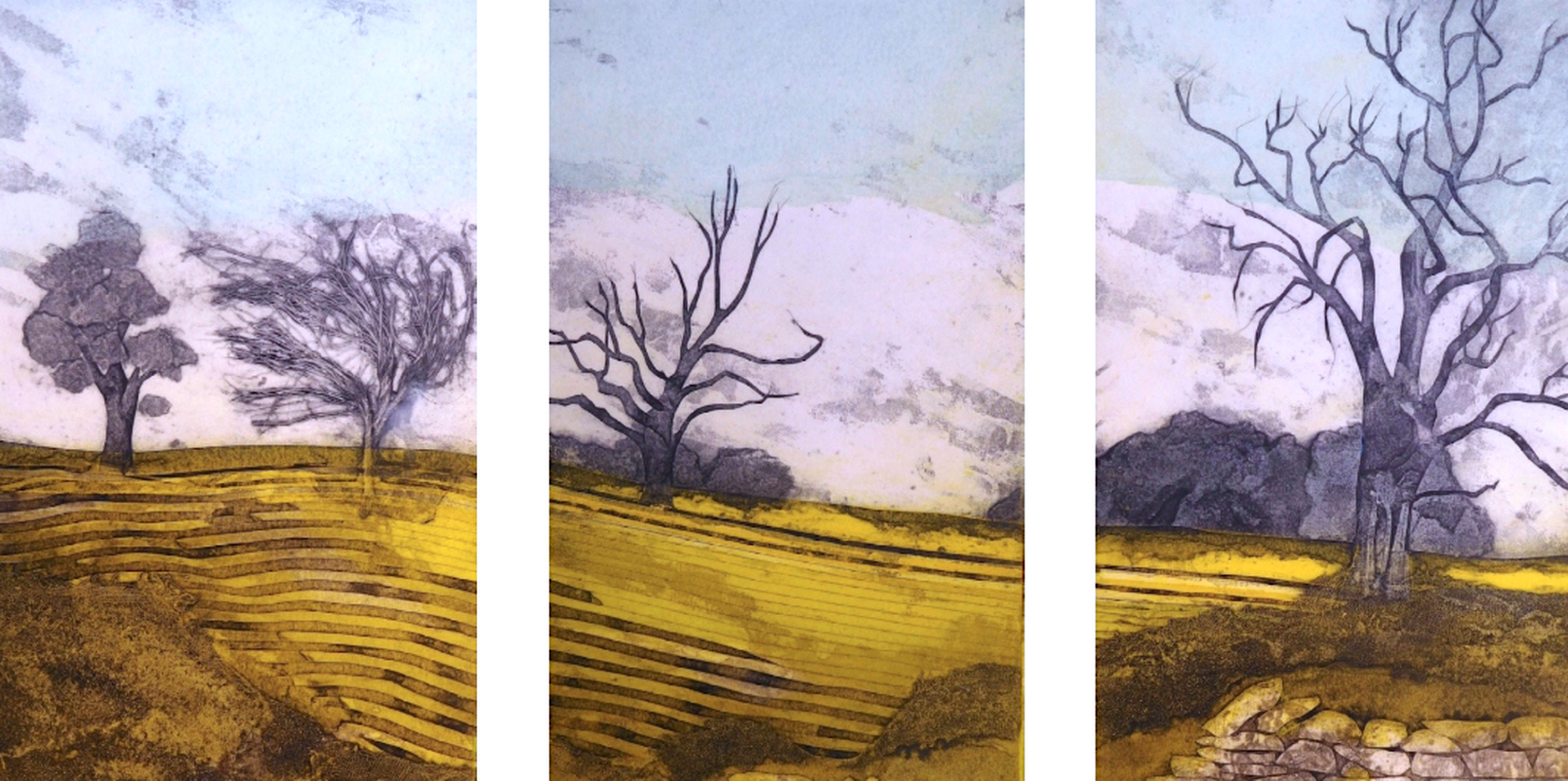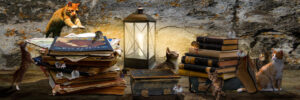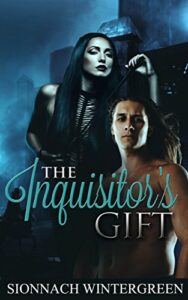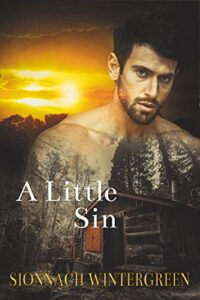
SARAH ROSS-THOMPSON AND THE ART OF COLLAGRAPHED PRINTS
I interviewed artist Sarah Ross-Thompson whose exceptional Collagraphed prints use fabrics, lichen, porridge and string to create images of the dramatic Scottish Highlands where she


I interviewed gender-queer author of male-to-male love stories, Sionnach Wintergreen, asking questions about her place on the trans spectrum, her books and her unusual marriage.
Sionnach says of herself in her CV: “Sionnach (pronounced shuhn ukh) Wintergreen is the author of gay romance, epic fantasy, and adult fantasy. (She uses feminine personal pronouns because she has lived most of her life responding to them, but she would love it if people used ‘they’.) Her character-driven stories usually involve misfits because she is one.”
Sionnach is an animal lover and social activist living in Austin, Texas who has, in her own words, “One wonderful human son.”
Leslie: You’re biologically a woman and you present as a woman, so can you describe what it means when you call yourself ‘gender-queer’ please?
Sionnach: Gender identity is how people perceive their own gender. My perception of myself is basically intersex, the modern term for hermaphroditism. It’s complicated. I first heard the term genderqueer about ten years ago and liked it because it’s a blanket, nebulous term for someone who doesn’t fit neatly into a male or female gender identity. Gender-fluid, as I understand it, is where someone feels male or female at different times. I feel blended most of the time. My outward expression is usually female because it’s just easier. Maybe I’m cowardly. I don’t know. I pack sometimes, but under skirts or dresses, so nobody knows but me.
Leslie: How did being gender-queer first manifest itself, and how has it affected you at different stages of your life?
Sionnach: As a child, I didn’t like dolls. I played with stuffed or plastic animals. I feel like that was partly because I saw myself as ‘other’. I pretended to be animals, usually male animals, and didn’t like ‘house’ or any of the usual games girls played. I wasn’t a tomboy. I wasn’t athletic or outdoorsy. My friends were soft, nerdy boys, but I often played by myself.

I had a rough time in middle school and high school. I didn’t fit in anywhere. I wasn’t attracted to straight (cis-gender, cis-sexual) boys. I worried that something was wrong with me. I stayed ‘to myself’ most of the time. I hated my body. It felt wrong, and I didn’t know what to do with it.
As a young adult, I continued to have problems with sexuality. I loved lesbians, but I wasn’t sexually attracted to women. I loved gay men, but they weren’t sexually attracted to me. I didn’t like having sex with straight men. It felt wrong. I didn’t understand what was wrong until later.
I had gay friends who would call me a faghag, a term I never liked. I tried to explain to a friend once that I didn’t want to date him, I wanted to be him. He told me to be happy because I could date men and nobody cared. It was the nineties in Texas. He had a point.
In my early twenties, I worked as a stripper and as a dominatrix. As a stripper, I wore high heels and makeup and glitter and so forth, but I always felt like I was playing a role. It was never me. It was something I did to support myself as a single mother in a town where most of the jobs were at chemical plants and required skills I didn’t have. During the day, I often dressed as a boy. I was skinny back then, and even ‘passed’ sometimes. I was always delighted when people thought I was a boy. I was terribly lonely, though. I dated straight or bi men and couldn’t make any relationship work for long. I didn’t know what was wrong with me. I didn’t even know about trans males back then. The only trans people I knew were trans women. (Back then, they were called transsexual, a misnomer since trans is about gender identity, not sexuality.)

When I was twenty-six, I met my husband. I knew something was different about him as soon as I met him. I could just tell. Shortly after we got together, he showed me a picture of a strap-on penis to see if I was interested. He hadn’t tried one before, but was intrigued by the idea. I wanted to try it immediately. The first time I put one on, everything clicked. My body finally looked the way I thought it should look, and functioned, more or less, the way I wanted it to function.
There’s a fetish called ‘pegging’ where straight women wear strap-ons and have sex with straight men. I don’t peg. I’m not using a toy. I’m using a prosthetic. This is the way my body is supposed to be.
Leslie: Can you describe, please, the stand-out moments when you experienced prejudice and the times you were lifted and helped to become yourself.
Sionnach: I don’t know that I’ve truly experienced much prejudice. I suppose my feelings have been hurt when people call me a woman, especially after I’ve told them I’m genderqueer, but I look and sound like a woman, so I understand. Most of my queerness is internal and/or private, so people don’t realize I’m different. This is one of the reasons why I feel, and have always felt, very protective of trans men and women. Some of them can’t hide or blend and it’s difficult to explain, but I feel guilty sometimes that I do. I didn’t know that I was a member of the trans community until a few years ago when I went to the Texas capitol to protest the bathroom bill and a trans doctor explained that the trans community consisted of trans men, trans women, and non-binary people. It made me cry, because I realized that I finally belonged to a group.
Leslie: Who are your gender nonconforming heroes? When and how did you discover them, and how have they changed your outlook and feelings?
Sionnach: I always loved David Bowie and Annie Lennox because they played with gender norms. I love Jess Helene Herbst, the mayor of New Hope, Texas. She’s a trans woman. I met her during one of the bathroom bill protests. She’s really brave and wonderful. You’re one of my heroes, Leslie! I saw one of your Twitter ads for Heaven’s Rage and had to buy it. I loved its raw honesty and poetic language. You’re incredibly brave—and a wonderful writer. People don’t see me as I am, so I guess I’m in awe of people who don’t wear a mask in public.

Leslie: There are a number of terms, such as cis-gendered, gender-fluid, non-binary and gender dysphoria that trans people use. There are also issues about pronouns. What do you feel about these terms? Have you experienced them as helpful or problematic, or both?
Sionnach: As far as the taxonomy goes, I appreciate all of the modern terms. Sometimes they can pigeonhole people, I guess, but I’ve always liked having names for things. I’m forty-six. I grew up with the terms gay, lesbian, transsexual (always female), and hermaphrodite. These were very limiting. I like that these days we can talk in terms of gender identity, gender expression, biology, and sexuality. I have a young trans male friend who is taking hormones, and I’m somewhat envious. This is a good time to be alive. It’s exciting, and I think having words that express ourselves is part of what has made life better.
Leslie: Your husband is a gender nonconforming man. Can you describe how that manifests itself, please?
Sionnach: My husband looks like a typical straight guy. He’s a big guy, six foot three. He says he doesn’t understand straight men most of the time and feels more like a woman. Some of his hobbies seem feminine—crocheting, for instance. He’s more interested in housewares and interior decorating than I am. Once, we went to an antique mall to purchase some things for our offices. I bought an armful of Incredible Hulk action figures; he bought a Depression glass candy dish and a feminine-looking Victorian desk set. Those are the public ways he is gender nonconforming. Privately, he often wears women’s lingerie when we make love. I like lingerie, too. Things that make me look dangerous—black vinyl, etc. He prefers frilly, lacy confections in pastels with garter hose. He likes to feel soft and pretty. He likes to be submissive. We fit together beautifully.

Leslie: Would you like to describe the books you write – which one is your favourite, and why, please?
Sionnach: At the moment, I’m mostly writing m/m (male/male) romance. I have an epic fantasy trilogy I hope to finish this year, but nobody buys those books. My m/m romances actually pay for their covers. All of my books are fairly different from each other in terms of style, setting, etc., but I think the characters are similar in that they’re almost always outcasts. They’re always a bit ‘off’ and not quite comfortable in their surroundings.
My favorite book is usually the last one I finished. In this case, it’s A Little Sin, which is an m/m mystery romance set in rural Texas in 1923. It’s full of colorful idioms, most of which came from the grandparents who primarily raised me, and is written in a simple style. The main characters are both very religious Christians, which felt at times a little bizarre, since I’m pagan and my husband and son are atheists.
Leslie: What are your readers like, what are they looking for, and what do you deliver that might go beyond their expectations? Why do you use a pseudonym?
Sionnach: I suppose one of the things that sets my books apart from a typical romance is that I like to explore subjects that aren’t often seen in romances. For instance, there’s a school shooting in Zen Alpha and The Inquisitor’s Gift condemns state-sponsored torture. The time that A Little Sin is set in is rife with prejudice. It’s fun to ‘ground’ what could be an entirely fluffy piece with something a little heavier.
M/m romance is primarily read by young women. I’ve been seeing (on Goodreads) men reading my books, as well. I want my readers to feel like the characters are their friends, and I hope, when they reach the end of the book, that they’ve had a good time.
I use a pseudonym primarily because I write erotic romances with sexually explicit scenes that I don’t want my family, nor my husband’s evangelical Christian family members, knowing about. It’s also my pagan name. Sionnach means ‘fox’ in Gaelic. Foxes are sort of between cats and dogs. They’re not quite either one. (Like me with male and female.) I’ve always loved them. The wintergreen symbolizes healing and protection. I often feel healed while writing; I hope readers feel some of that love.

Leslie: Would you like to expand on your statement that ‘my experiences as a dominatrix, preschool teacher, and grant writer for an animal rescue group colour my work’?
Sionnach: I probably need to update that bio. I worked as a dominatrix for a while in my early twenties and have practiced BDSM for over twenty years. I added that fact to the release of a BDSM romance, Lover Destroyer, to show that I actually knew what I was talking about when writing BDSM scenes. There are writers out there who are only using their imaginations and what they’ve seen on television or porn or something. I draw from my actual experiences. Some reviewers hated that book because they said the BDSM was too intense. It drove me crazy. I haven’t written another BDSM book since, but might in the future. It’s a very misunderstood subculture.
Working with children was wonderful and taught me to have a more positive outlook on life. My books often have a playful quality and I try to have happy endings.
I was a volunteer grant writer for a cat rescue group as well as a transporter and sanctuary volunteer. I love animals. I like them better than most people. There are always animals in my books. They figure heavily both as symbols and as characters. If it weren’t for an adventurous tuxedo cat, my lovers in Zen Alpha would probably not have gotten together. Garland, one of the main characters in A Little Sin, is a veterinarian. As a kid, I devoured the James Herriot books the way modern kids do Harry Potter. Having Garland be a veterinarian was a way to reconnect with those memories and provided an excuse to fill the book to the brim with animals.
Leslie: Living where you do, what are the ways you’ve found to avoid the macho side of Texas culture?
Sionnach: Growing up here, it’s really hard to escape all of the macho culture. My husband and I are vegetarians who live in the land of barbecue. Literally. Austin is actually progressive, but the suburb we live in is pretty conservative. We escape it more with each other, in private. Our home is like an oasis where we get to be ourselves.
Next week I interview Kali Meister, spiritual healer, empath, claircognizant, and stand-up comedian.
ABOUT LESLIE TATE’S BOOKS:

I interviewed artist Sarah Ross-Thompson whose exceptional Collagraphed prints use fabrics, lichen, porridge and string to create images of the dramatic Scottish Highlands where she

Part 2 of my interview with Mark Statman looks closely at Mark’s Latin American poetic influences, his life in Mexico and ends with an extract

I interviewed international poet and translator Mark Statman about Volverse/Volver, his 14th published collection. Mark, who has won national arts awards, is Emeritus Professor of Literary

I interviewed Lisa Dart, finalist in the Grolier, Aesthetica and Troubadour Poetry Prizes and author of The Linguistics of Light (poems, Salt, 2008), Fathom (prose

I interviewed writer Julia Lee Barclay-Morton about her experience of autism. Julia began as an experimental dramatist in New York, moving to the UK to
| Cookie | Duration | Description |
|---|---|---|
| cookielawinfo-checkbox-analytics | 11 months | This cookie is set by GDPR Cookie Consent plugin. The cookie is used to store the user consent for the cookies in the category "Analytics". |
| cookielawinfo-checkbox-functional | 11 months | The cookie is set by GDPR cookie consent to record the user consent for the cookies in the category "Functional". |
| cookielawinfo-checkbox-necessary | 11 months | This cookie is set by GDPR Cookie Consent plugin. The cookies is used to store the user consent for the cookies in the category "Necessary". |
| cookielawinfo-checkbox-others | 11 months | This cookie is set by GDPR Cookie Consent plugin. The cookie is used to store the user consent for the cookies in the category "Other. |
| cookielawinfo-checkbox-performance | 11 months | This cookie is set by GDPR Cookie Consent plugin. The cookie is used to store the user consent for the cookies in the category "Performance". |
| viewed_cookie_policy | 11 months | The cookie is set by the GDPR Cookie Consent plugin and is used to store whether or not user has consented to the use of cookies. It does not store any personal data. |
4 responses
I found this very interesting. Leslie. it is hard to be different from the pack. whether it is due to a different way of thinking, a very high intellect or having a different sexual preference or outlook. I often think I would have been burned at the stake as a witch a couple of hundred years ago. Hugs to you both for making this world a better and more accepting place for all of us.
Thanks, Robbie. Yes, witches were independent thinkers. I’m returning your hugs with a broad smile.:) 🙂 🙂
Thank you for this interesting interview, Les. I think its exciting that those of us who often get pressure to ‘conform’ to one hegemonic norm or another, are finally finding a vocabulary for ourselves.
Thanks, Barbara. I agree: the part about language is one of the most important parts of the interview. 🙂 🙂 🙂